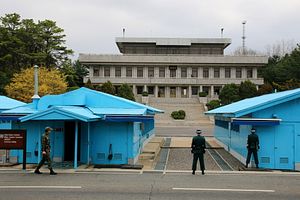Two important and unsettling events took place earlier this month: North Korea claimed to have detonated a thermonuclear bomb, and India’s Pathankot airbase was the victim of an attack by Pakistan-based militants. While seemingly unrelated, the two events have more in common than readily apparent: Each fits a long established pattern of behavior intended to extort international concessions by exploiting global anxiety about nuclear terrorism.
The most immediate connection between these two events is the provenance of North Korea’s nuclear weapons program: Pakistani metallurgist A.Q. Khan, the man who stole nuclear secrets from his employer in Holland and passed them on to Pakistan’s military. In the 1990s, Pakistan sold nuclear weapons technology to North Korea, as well as Iran, Libya and possibly other states. A.Q. Khan was briefly held under house arrest until he received a full pardon from Pakistan’s military dictator and president Gen. Pervez Musharraf. Yet, there is another commonality between North Korea’s nuclear weapons program and a fidayeen attack on an Indian airbase: strategy.
Writing in Foreign Affairs, Sung-Yoon Lee and Joshua Stanton described North Korea’s foreign policy in this way: “Offer a fake overture of peace; raise the stakes for your foes with a provocation; act unstable and threaten to escalate even further; and finally, call for talks and act reasonable. Pyongyang seizes and maintains the initiative from beginning to end and leaves its adversaries anxious for negotiations in the face of provocations.”
Such a strategy should sound remarkably familiar to South Asia watchers, as it echoes the strategy employed by Pakistan.
The Hudson Institute’s Aparna Pande has chronicled four recent examples of Pakistan making overtures of peace, followed by a vicious jihadi attack, and finally culminating in the Pakistani government declaring its desire to proceed with peace talks so that the terrorists don’t win. The attack on Pathankot airbase also follows this pattern.
Increasingly, the Pathankot attack appears to have been carried out by jihadi militants associated with Jaish-e-Mohammad (JeM), a transnational terrorist organization founded by Masood Azhar under the patronage of Pakistan’s Inter-Services Intelligence (ISI), the country’s premier military intelligence organization. After having been dormant for several years, JeM resurfaced in early 2014 when Masood Azhar addressed a rally well orchestrated in Pakistan-controlled Kashmir shortly after Gen. Raheel Sharif took over as Pakistan’s Chief of Army Staff.
Gen. Raheel has declared a policy of “zero tolerance” for militancy, a position that he reiterates after each militant attack. In practice, however, certain militant groups are tolerated, if not directly sponsored by the military. Last year, the State Department praised Pakistan for following through on its international obligations to ban Islamist militant groups including the Haqqani Network and Jamaat-ud-Dawa, only to find out that the groups were not actually banned at all. Even nominally-banned groups, such as the Ahle Sunnat Wal Jamaat (ASWJ), a virulent anti-Shia organization, are expanding.
This is no accident. Pakistani National Security Advisor Sartaj Aziz has openly admitted that the state has no interest in shutting down militant groups that it deems friendly to Pakistan’s interests. Well-meaning sympathizers accept the Pakistani contention that they can’t actually go after all militants because doing so would present an insurmountable threat – there are so many militants that taking them all on would destabilize the entire country, putting at risk its ever expanding nuclear arsenal. This conveniently ignores the fact that the problem is one of Pakistan’s own making.
Pakistan cultivated jihadi militant groups like Lashkar-e-Taiba (LeT) and JeM for decades both as force multipliers and proxy forces that can carry out attacks without the clear imprint of the state. The last part is key: Pakistan’s jihadi assets provide the cover of plausible deniability that allows the state to approach India or the U.S. and pretend that it is sincerely working to change the situation. The problem is that Pakistan’s jihadi monster has grown bold enough that it’s turned on its patron. Around 30,000 Pakistanis have been killed by jihadi militants, including over 1,000 in 2015. After militants killed 140 schoolchildren in 2014, Pakistan’s security establishment promised to change its ways, but “pro-Pakistan” militants have continued to flourish.
If North Korea’s international strategy is based on Richard Nixon’s “Madman theory” – the gamble that other countries will not risk provoking them for fear of an unpredictable and disproportionate response, Pakistan uses a slightly more sophisticated technique: “Good Cop, Bad Cop.” The “good cop” being the Pakistani state, the “bad cop” being jihadi militant groups. Pakistan promises to restrain its jihadis if only the U.S. or India will make certain concessions. As a result, the U.S. has provided Pakistan’s military with billions of dollars in cash payments and arms sales. In return, Pakistan has continued to support a variety of jihadi militant groups, including those responsible for attacks on American soldiers.
The White House has cast doubt on North Korea’s claims, saying that early evidence is inconsistent with the detonation of a thermonuclear device. Nevertheless, it is clear that North Korea is once again turning to its tried and true strategy to improve its negotiating position. Regarding Pakistan, White House Spokesman John Kirby told reporters following the Pathankot attack that “the Government of Pakistan has said publicly and privately that it’s not going to discriminate among terrorist groups.” Of course, Pakistan has said this before, and it will continue to so as long as Washington continues to believe them. And the cycle will repeat until either Washington decides to break it, or Pakistan finally loses control completely.
Seth Oldmixon is president of Oldmixon Group, a Washington, D.C. public affairs firm and the founder of Liberty South Asia, a privately funded campaign dedicated to religious freedom and political pluralism in South Asia.

































